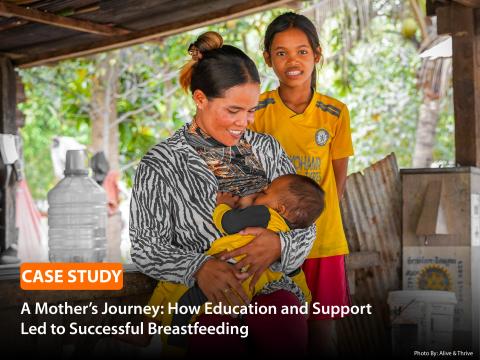A mother’s journey: How education and support led to successful breastfeeding

It is a scorching afternoon in Ta Pang village, Kdey Run commune of Pouk district, Siem Reap province. The village is alive with the sounds of children playing, chickens clucking, and the occasional motorbikes, cars and trucks passing through a newly constructed road. In one small, old wooden house, Sambo, a 36-year-old mother of three, was sitting on a mat with her youngest son, Sothea, who is now turning 8 months old.
Sambo returned to her hometown from Poipet City, where she lived and worked with her husband, when she was about 6 months pregnant with Sothea, to deliver at the health centre in her commune. Upon returning to the village, she heard about a group of pregnant women and breastfeeding mothers who were receiving education on various topics, including ante and post-natal care (ANC & PNC), breastfeeding, nutrition, hygiene, and family planning, with support from community health workers technically supported by the health centre’s staff (facilitated by World Vision International in Cambodia). Through close coordination with the community health workers, Sambo became a member of the mothers’ group and attended two awareness sessions on nutrition and breastfeeding with the facilitators.
During her pregnancy with Sothea, Sambo received antenatal care from the Cha Chhouk Health Centre midwife. Being an ID-Poor holder, Sambo was aware since she had received financial support from the cash transfer scheme of the Royal Government of Cambodia until her son turned two years old. Under this current scheme, pregnant women and mothers of children under 2 from ID-Poor households are entitled to receive a total cash transfer from the government for KHR1,520,000 (USD380) that starts from the first antenatal care visit until the completion of the last and 7th vaccination appointment.
Sambo delivered her son at Char Chouk Health Centre and stayed there for two nights and three days before discharge. At the health centre, she was given advice on 6-month exclusive breastfeeding, expression of breastmilk, how to properly store expressed breastmilk, cup-feeding, and continuous breastfeeding along with complementary food starting at 6 months of age.
When asked why she decided to opt for exclusive breastfeeding and continue to breastfeed her son, Sambo mentioned the long-term health benefits for her son while also stressing about the unaffordability of purchasing baby-commercial milk products. She said, “It’s comfortable and breastfeeding provides good health for children and mother.”
Besides breastmilk, Sambo now also cooks supplementary meals with different food groups known as enriched porridge, “Bobor Khab Krob Kroeung” (porridge and animal-based foods). She obtained this knowledge from health centre staff and community health workers.
Sambo shares with joy, “My son loves it so much. He constantly eats a lot even when he sometimes doesn’t feel well. It’s a delight to see him grow and thrive.”
Although Sambo is aiming to go back to work and live with her husband in Cambodia—Thailand border city, Poipet, she is committed to breastfeeding her son until he turns 2 years old.
Sambo’s story is a testament to the power of education and support in promoting healthy practices among mothers and their children. With the help of community volunteers and health workers, Sambo has provided her son with the best possible nutrition and care, setting him up for a healthy and bright future.
By: Sokhim Yav & Munint Mak